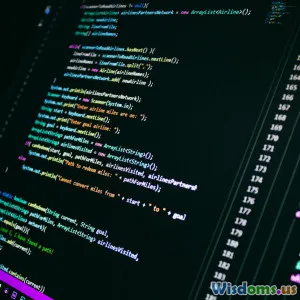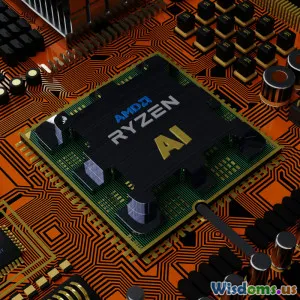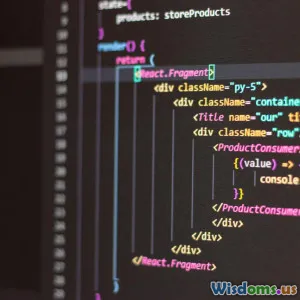
How GitHub Copilot is Changing the Way We Code
8 min read Discover how GitHub Copilot is revolutionizing coding with AI-powered assistance, boosting productivity and transforming developer workflows. (0 Reviews)
How GitHub Copilot Is Changing the Way We Code
In an era where artificial intelligence continues to permeate nearly every industry, software development is undergoing one of its most dynamic transformations. GitHub Copilot, an AI-powered coding assistant developed by GitHub in collaboration with OpenAI, is at the forefront of this technological revolution. Imagine pair programming with an AI that instantly understands your intent, suggests complete functions, anticipates needs, and helps you write cleaner, more efficient code. This is no longer a distant vision—it’s happening now.
The Dawn of AI-Assisted Coding
GitHub Copilot leverages OpenAI's Codex model to provide real-time code suggestions directly in the developer's editor. Launched in 2021, this tool quickly gained attention for its unique ability to autocomplete lines of code, generate entire functions, and even propose complex algorithms from just a few comments or starter lines. Its developers describe it as "your AI pair programmer."
According to GitHub, over 1 million developers were using Copilot within its first year, indicating widespread interest. Developers from hobbyists to enterprise programmers began experiencing a paradigm shift in how they write code. But how exactly is Copilot changing programming?
Rewriting Productivity Norms
Faster Development Cycles
One of the most tangible benefits of Copilot is accelerated development speed. Traditional coding involves weaving logic from scratch, consulting documentation frequently, and debugging iterative mistakes. Copilot reduces this friction. For example, by typing a simple comment like // function to calculate factorial, Copilot can generate the entire factorial function instantaneously in multiple languages. This speeds up initial coding phases by removing the need to mentally map standard algorithms during implementation.
Microsoft reports that programmers using Copilot show up to a 55% improvement in coding speed during certain tasks. This allows developers more time to focus on complex problem-solving and higher-level system design rather than routine code generation.
Improved Code Quality and Fewer Errors
Copilot's suggestions are not randomly generated lines but are informed by training on billions of lines of code from publicly available repositories. This means it often produces idiomatic, well-structured, and tested approaches that align with best practices. While it requires human review, it helps reduce common bugs, such as syntax errors or typical off-by-one mistakes.
One example is Copilot’s ability to assist with input validation or error handling snippets, which less experienced developers might overlook. By suggesting these defensive programming patterns, it indirectly improves security and software robustness.
Democratizing Software Development
GitHub Copilot opens doors for beginners to jump into coding more confidently. For learners, complex syntax, boilerplate code, and understanding patterns can be daunting. Acting like a tutor, Copilot writes scaffolded code and even explains potential usage via comments, making it easier to understand how certain chunks fit together.
This democratization helps narrow the skills gap. For instance, an aspiring developer without deep knowledge in asynchronous programming can rely on Copilot to generate workable async functions in JavaScript or Python, accelerating their learning and enabling them to build functional applications earlier.
Evolving Developer Roles and Collaboration
The Rise of AI-Human Collaboration
Just as calculators revolutionized mathematics, AI assistants like Copilot are reshaping the role of developers from manual coders to supervisors and curators of AI-generated solutions. Developers now focus more on designing architectures, addressing edge cases, and creatively pushing boundaries while Copilot manages boilerplate and routine coding.
According to a survey by GitHub in early 2023, 70% of Copilot users reported that the AI helped them explore unfamiliar libraries or frameworks by suggesting relevant API usages, effectively expanding their toolkit beyond prior expertise.
Challenges and Ethical Considerations
Despite its advantages, Copilot raises valid concerns. Since it’s trained on public repositories, it can sometimes suggest code snippets with incompatible licenses or perpetuate biased or insecure coding patterns. Developers need to be vigilant and verify suggestions thoroughly.
Moreover, there is ongoing debate about the implications of AI possibly displacing certain coding tasks. However, experts like Tracy Chou, a renowned software engineer, emphasize that tools like Copilot should be viewed as assistants expanding human capability—not replacements.
Looking Ahead: The Future of Coding with AI
GitHub Copilot is just the beginning. As AI models improve and integrate deeper into developer tooling, the nature of programming will continue evolving. Imagine AI helping optimize code performance on the fly, conducting instant code reviews for security flaws, or designing entire systems based on high-level requirements.
Already, enterprises are leveraging Copilot Enterprise to embed AI into large-scale software teams, integrating with CI/CD pipelines and custom project repositories securely. This hints at a future where AI is an inextricable partner in software innovation, promising not only efficiency but also fostering creativity by offloading mundane tasks.
Conclusion
GitHub Copilot represents a milestone in the intersection of artificial intelligence and software engineering. By significantly accelerating development cycles, aiding beginners, and promoting code quality, it is reshaping how we approach coding. While challenges in ethics and accuracy remain, the collaborative future between developers and AI assistants is bright.
As Copilot and similar technologies mature, programmers will find themselves empowered to tackle more ambitious projects with enhanced creativity and efficiency—heralding a new era where humans and machines collectively redefine the boundaries of software development.
References:
- GitHub Copilot official blog: https://github.blog/2021-06-29-introducing-github-copilot-ai-pair-programmer/
- Microsoft Dev Blog: "How AI is Accelerating Developer Productivity"
- Survey results on AI-assisted programming, GitHub 2023
- Interview with Tracy Chou on AI and ethics in coding, TechCrunch 2023
Rate the Post
User Reviews
Popular Posts




















